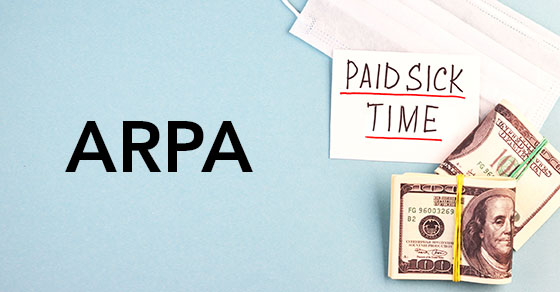
The Families First Coronavirus Response Act (FFCRA) was among the first major laws enacted in response to the COVID-19 pandemic. It allows employees paid sick time and paid family leave time to care for themselves or loved ones during the ongoing public health crisis. In turn, eligible employers can claim tax credits to offset the costs of providing the leave.
FFCRA paid leave has been subject to various guidance over the past year, and the rules have changed yet again under the recently signed American Rescue Plan Act (ARPA). Changes under the ARPA apply to amounts paid during calendar quarters beginning after March 31, 2021. Here are some highlights:
- The FFCRA paid sick time and paid family leave credits have been extended from March 31, 2021, through September 30, 2021.
- Paid sick and paid family leave credits may each be increased by the employer’s share of Social Security tax (6.2%) and employer’s share of Medicare tax (1.45%) on qualified leave wages.
- Credits for paid sick and family leave can be structured as a refundable payroll tax credit against Medicare tax only (1.45%), beginning after March 31, 2021.
- The amount of wages for which an employer may claim the paid family leave credit in a year has increased from $10,000 to $12,000 per employee.
- The paid family leave credit has been expanded to allow employers to claim the credit for leave provided for the reasons included under the previous employer mandate for paid sick time. For the self-employed, the number of days for which individuals can claim the paid family leave credit has been increased from 50 to 60 days.
- The paid sick and family leave credit can be claimed by employers who provide paid time off for employees to obtain the COVID-19 vaccination or recover from an illness related to the immunization.
- The paid sick and family leave credit has been increased by the cost of the employer’s qualified health plan expenses. It has also been increased by the employer’s collectively bargained contributions to a defined benefit pension plan (as defined under the tax code) and the amount of collectively bargained apprenticeship program contributions.
- A nondiscrimination requirement has been established whereby no credit will be permitted to any employer who discriminates in favor of highly compensated employees (as defined under the tax code), full-time employees or other employees on the basis of employment tenure.
- The 10-day limitation on the maximum number of days for which an employer can claim the paid sick leave credit with respect to wages paid to an employee has been reset. The current 10-day limitation runs from the start of the credits in 2020 through March 31, 2021. For the self-employed, the 10-day reset applies to sick days after January 1, 2021.
The paid leave originally introduced under the FFCRA and now updated under the ARPA remains an important relief measure for employers and employees alike.
© 2021
---
The information contained in the Knowledge Center is intended solely to provide general guidance on matters of interest for the personal use of the reader, who accepts full responsibility for its use. In no event will CST or its partners, employees or agents, be liable to you or anyone else for any decision made or action taken in reliance on the information in this Knowledge Center or for any consequential, special or similar damages, even if advised of the possibility of such damages.